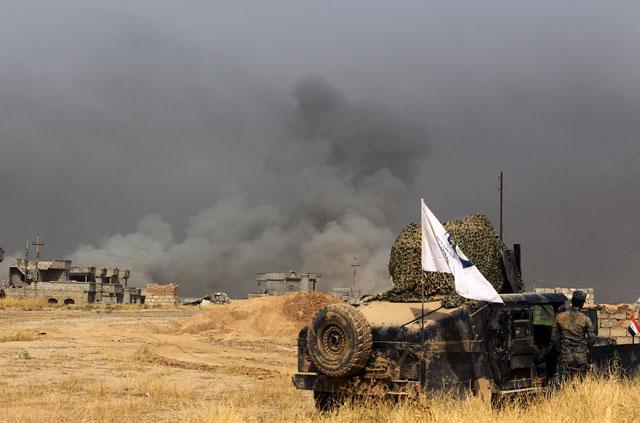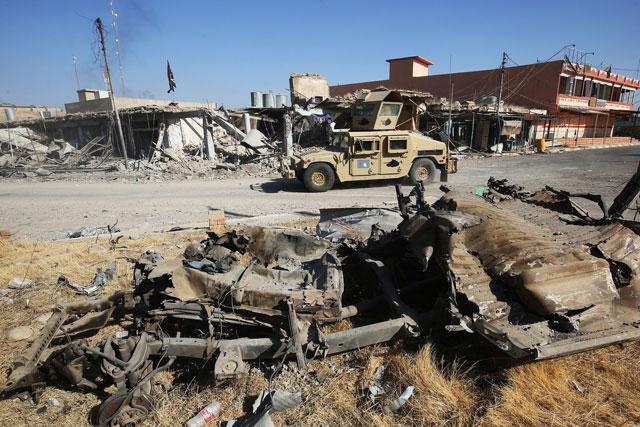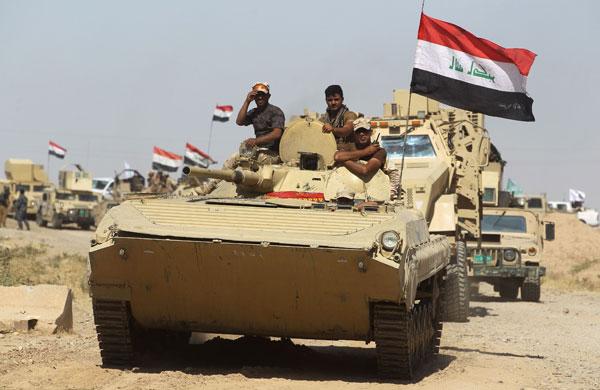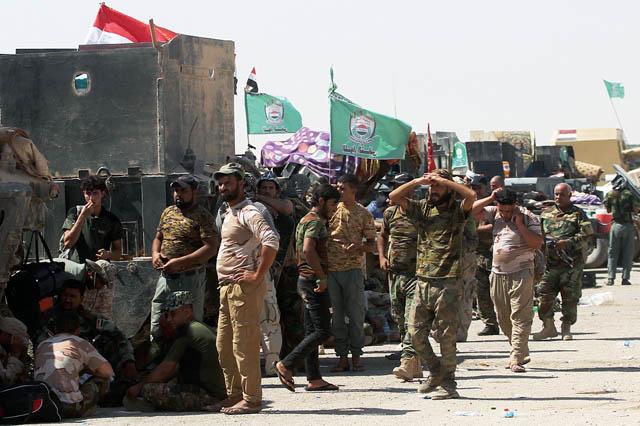You are here
Iraq brings all remaining Daesh territory under attack
By AFP - Sep 21,2017 - Last updated at Sep 21,2017

Smoke plumes rise from an explosion as Iraqi forces advance towards the city of Al Sharqat on Thursday, where Iraqi forces backed by Hashed Al Shaabi (Popular Mobilisation) paramilitaries are preparing to retake the extremist-held city of Hawija in the province of Kirkuk, 300 kilometres northwest of Baghdad (AFP photo)
BAGHDAD — Iraq brought all of its territory still held by the Daesh terror group under attack Thursday, throwing the extremists on the defensive across their self-proclaimed "caliphate" extending into neighbouring Syria.
Security forces backed by paramilitary units launched a dawn assault on a besieged Daesh-held pocket around the northern town of Hawija, just days after attacking the extremists' only other foothold in the country.
The territory still held by Daesh has been dwindling fast since its defeat in Iraq's second city Mosul in July, with stronghold after stronghold coming under assault on both sides of the border with Syria.
Most of its onetime Syria bastion Raqqa, long a byword for its most gruesome atrocities, is now in the hands of US-backed fighters, while elsewhere in Syria Daesh has suffered major losses to Russian-backed government forces.
Iraqi Prime Minister Haider Al Abadi predicted that the assault on the Hawija region would swiftly bring a new victory against the crumbling extremists.
The mainly Sunni Arab enclave, which was bypassed by government forces in their advance north to Mosul last year, has been a bastion of insurgency ever since the first year of the US-led occupation in 2003.
After the defeat of Daesh in Mosul and the recapture of adjacent areas, Hawija and neighbouring towns form the last enclave still held by Daesh in Iraq apart from a section of the Euphrates Valley downstream from the border with Syria.
'Victory after victory'
"At the dawn of a new day, we announce the launch of the first stage of the liberation of Hawija, in accordance with our commitment to our people to liberate all Iraqi territory and eradicate Daesh's terrorist groups," Abadi said.
“Greetings to all of our forces, who are waging several battles of liberation at the same time and who are winning victory after victory and this will be another, with the help of God,” he said.
An AFP correspondent heard heavy shelling around the Daesh-held town of Sharqat where Iraqi forces have been massing in recent days.
A spokesman for Iraq’s Joint Operations Command, General Yahya Rasool, said retaking Sharqat was the first goal of the offensive.
The US-led coalition fighting Daesh hailed the new offensive by the Iraqi security forces against the extremist group.
“Daesh is losing ground and failing in every battle. Soon ISIS [Daesh] will have no sanctuary in Iraq,” said coalition spokesman Colonel Ryan Dillon.
Concern for civilians
Humanitarian organisations expressed concern for the fate of civilians caught up in the offensive.
“The 85,000 civilians still in and around Hawija, including around 40,000 children, now face a terrifying time as they worry about getting caught up in the fighting or being hit by an air strike,” said International Rescue Committee acting country director Jason Kajer.
“For those who decide to flee, there is a significant risk of being targeted by ISIS snipers or killed by a mine.”
The Hawija area was the second after Mosul to be captured by Daesh in its lightning offensive through the Sunni Arab heartland north and west of Baghdad in 2014.
Its inhabitants are deeply hostile both to the Shiite-led government in Baghdad and to the Kurds who hold adjacent areas of Kirkuk province where they form the historical majority.
Preparations for the offensive against Hawija have been overshadowed by an independence referendum that Kurdish leaders plan to hold on Monday, in areas including Kirkuk, against the wishes of the federal government in Baghdad.
Daesh has seen the territory under its control fast diminish in recent months in the face of multiple offensives against its fighters in both Iraq and Syria.
On Tuesday, Iraqi forces launched an attack up the Euphrates Valley against the other one of Daesh’s two remaining enclaves in Iraq.
And in Syria’s eastern province of Deir Ezzor, Daesh faces twin assaults — one by Russian-backed government troops and the other by US-backed fighters of the Syrian Democratic Forces.
Further up the Euphrates, the SDF now controls 90 per cent of the city of Raqqa, the Britain-based Syrian Observatory for Human Rights war monitor said on Wednesday.
The US-led coalition supporting the SDF estimated that 65-70 per cent of Raqqa is now under the control of the alliance of Kurdish and Arab fighters.
The extremists seized Raqqa in early 2014, making it their de facto Syria capital. They are thought to have used the city to plan attacks abroad.
Daesh also holds pockets of territory elsewhere in Syria, notably in eastern parts of the central provinces of Homs and Hama, but it has come under attack by Russian-backed government forces there too.
Related Articles
BAGHDAD — The “final large fight” in Iraq against the Daesh extremist group will take place on the border with Syria, a general in a US-led
BAGHDAD — Iraqi forces and Shiite paramilitaries captured an airbase from the Daesh terror group on Monday, the army said, gaining a strateg
TAL AFAR, Iraq — Iraqi forces backed by local militia and a US-led coalition were poised Sunday to drive the Daesh terror group from the cit



















